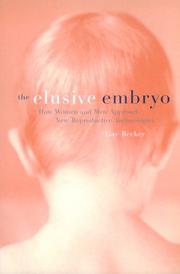| Listing 1 - 3 of 3 |
Sort by
|

ISBN: 1597344516 0520935837 9786612762499 1282762494 9780520935839 9781282762497 6612762497 0520228707 9780520228702 0520228715 9780520228719 9781597344517 Year: 2003 Publisher: Berkeley, Calif. University of California Press
Abstract | Keywords | Export | Availability | Bookmark
 Loading...
Loading...Choose an application
- Reference Manager
- EndNote
- RefWorks (Direct export to RefWorks)
From about seven children per woman in 1960, the fertility rate in Mexico has dropped to about 2.6. Such changes are part of a larger transformation explored in this book, a richly detailed ethnographic study of generational and migration-related redefinitions of gender, marriage, and sexuality in rural Mexico and among Mexicans in Atlanta.
Companionate marriage --- Mexican Americans --- Mexicans --- Man-woman relationships --- Marriage --- Female-male relationships --- Male-female relationships --- Men --- Men-women relationships --- Relationships, Man-woman --- Woman-man relationships --- Women --- Women-men relationships --- Interpersonal relations --- Mate selection --- Married life --- Matrimony --- Nuptiality --- Wedlock --- Love --- Sacraments --- Betrothal --- Courtship --- Families --- Home --- Honeymoons --- Marriage, Companionate --- Chicanos --- Hispanos --- Ethnology --- Sexual behavior --- Sexual behavior. --- Relations with women --- Relations with men --- Sociology of the family. Sociology of sexuality --- Mexico --- academic. --- atlanta. --- childbirth. --- cultural anthropology. --- doctors. --- domestic. --- ethnographic. --- ethnography. --- fertility issues. --- fertility rate. --- fertility. --- gender studies. --- gender. --- immigrants. --- latin america. --- marriage and family. --- marriage. --- medical science. --- mexico. --- reproduction. --- reproductive health. --- rural communities. --- rural mexico. --- scholarly. --- sexual intercourse. --- sexuality. --- social changes. --- womens health. --- womens issues.

ISBN: 159734589X 1282355090 9786612355097 0520925246 9780520925243 0585389926 9780585389929 9781282355095 9781597345897 6612355093 9780520224308 0520224302 9780520224315 0520224310 Year: 2000 Publisher: Berkeley University of California Press
Abstract | Keywords | Export | Availability | Bookmark
 Loading...
Loading...Choose an application
- Reference Manager
- EndNote
- RefWorks (Direct export to RefWorks)
In the first book to examine the industry of reproductive technology from the perspective of the consumer, Gay Becker scrutinizes the staggering array of medical options available to women and men with fertility problems and assesses the toll-both financial and emotional-that the quest for a biological child often exacts from would-be parents. Becker interviewed hundreds of people over a period of years; their stories are presented here in their own words. Absorbing, informative, and in many cases moving, these stories address deep-seated notions about gender, self-worth, and the cultural ideal of biological parenthood. Becker moves beyond people's personal experiences to examine contemporary meanings of technology and the role of consumption in modern life. What emerges is a clear view of technology as culture, with technology the template on which issues such as gender, nature, and the body are being rewritten and continuously altered. The Elusive Embryo chronicles the history and development of reproductive technology, and shows how global forces in consumer culture have contributed to the industry's growth. Becker examines how increasing use of reproductive technology has changed ideas about "natural" pregnancy and birth. Discussing topics such as in vitro fertilization, how men and women "naturalize" the use of a donor, and what happens when new reproductive technologies don't work, Becker shows how the experience of infertility has become increasingly politicized as potential parents confront the powerful forces that shape this industry. The Elusive Embryo is accessible, well written, and well documented. It will be an invaluable resource for people using or considering new reproductive technologies as well as for social scientists and health professionals.
Human reproductive technology --- Infertility --- Involuntary childlessness --- Sterility --- Sterility in humans --- Childlessness --- Generative organs --- Fertility, Human --- Sterilization (Birth control) --- Assisted conception --- Assisted human reproduction --- Assisted human reproductive technology --- Conception --- Human assisted reproduction --- Human assisted reproductive technology --- Human reproduction --- Medical technology --- Reproductive technology --- Patients --- Diseases --- Technological innovations --- biological parents. --- biology. --- birth parents. --- childbirth. --- conception. --- consumer culture. --- consumerism. --- cultural. --- embryo. --- emotional. --- feminism. --- fertility issues. --- fertility. --- finance. --- gender. --- global. --- in vitro fertilization. --- industry. --- international. --- medical. --- mental health. --- modern life. --- modern world. --- money problems. --- natural birth. --- parenting. --- pregnancy. --- reproduction. --- reproductive rights. --- reproductive technology. --- sexuality. --- social studies. --- technology. --- womens issues.

ISBN: 1282356100 0520927818 1597346772 9786612356100 9780520927810 9781597346771 9781282356108 9780520231085 0520231082 9780520231375 0520231376 0520231082 0520231376 6612356103 Year: 2002 Publisher: Berkeley University of California Press
Abstract | Keywords | Export | Availability | Bookmark
 Loading...
Loading...Choose an application
- Reference Manager
- EndNote
- RefWorks (Direct export to RefWorks)
This exceptional collection of essays breaks new ground by examining the global impact of infertility as a major reproductive health issue, one that has profoundly affected the lives of countless women and men. Based on original research by seventeen internationally acclaimed social scientists, it is the first book to investigate the use of reproductive technologies in non-Western countries. Provocative and incisive, it is the most substantial work to date on the subject of infertility. With infertility as the lens through which a wide range of social issues is explored, the contributors address a far-reaching array of topics: why infertility has been neglected in population studies, how the deeply gendered nature of infertility sets the blame squarely on women's shoulders, how infertility and its treatment transform family dynamics and relationships, and the distribution of medical and marital power. The chapters present informed and sophisticated investigations into cultural perceptions of infertility in numerous countries, including China, India, the nations of sub-Saharan Africa, Vietnam, Costa Rica, Egypt, Israel, the United States, and the nations of Europe. Poised to become the quintessential reference on infertility from an international social science perspective, Infertility around the Globe makes a powerful argument that involuntary childlessness is a complex phenomenon that has far-reaching significance worldwide.
Reproduction Techniques. --- Feminism. --- Cross-Cultural Comparison. --- Infertility --- Involuntary childlessness --- Sterility --- Sterility in humans --- Childlessness --- Generative organs --- Fertility, Human --- Sterilization (Birth control) --- Transcultural Studies --- Comparison, Cross-Cultural --- Comparisons, Cross-Cultural --- Cross Cultural Comparison --- Cross-Cultural Comparisons --- Studies, Transcultural --- Study, Transcultural --- Transcultural Study --- Cultural Characteristics --- Culture --- Feminist Ethics --- Ethics, Feminist --- Women's Rights --- Reproduction Technics --- Reproduction Techniques --- Reproductive Technologies --- Technology, Reproductive --- Reproductive Technology --- Reproduction Technic --- Reproduction Technique --- Reproductive Technique --- Technic, Reproduction --- Technics, Reproduction --- Technique, Reproduction --- Technique, Reproductive --- Techniques, Reproduction --- Techniques, Reproductive --- Technologies, Reproductive --- Selective Breeding --- Reproductive Medicine --- Reproductive Health Services --- psychology. --- Psychological aspects. --- Social aspects. --- Diseases --- body politics. --- childbirth. --- childlessness. --- cultural studies. --- domestic. --- essay collection. --- family issues. --- family life. --- fertility issues. --- gender issues. --- gender. --- globalization. --- health and wellness. --- infertility. --- medical field. --- medical issues. --- pregnancy. --- reproduction. --- reproductive health. --- reproductive technology. --- scientific. --- sexuality. --- social studies. --- technology. --- womens health. --- womens issues.
| Listing 1 - 3 of 3 |
Sort by
|

 Search
Search Feedback
Feedback About UniCat
About UniCat  Help
Help News
News